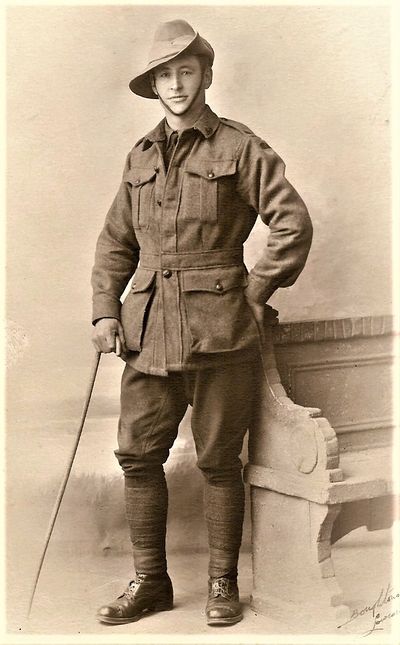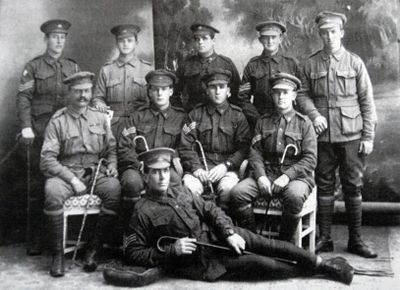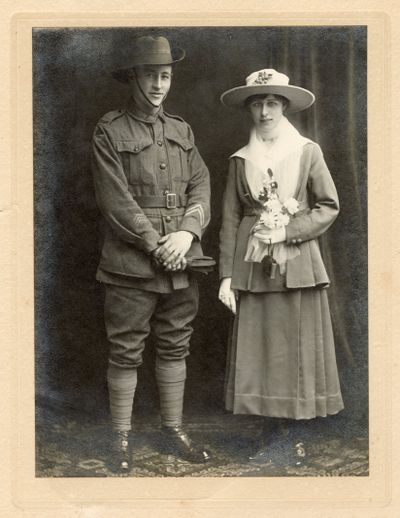Difference between revisions of "Gordon Devereux MM"
From Our Contribution
(→External Links) |
|||
| (4 intermediate revisions by the same user not shown) | |||
| Line 105: | Line 105: | ||
On 10 Aug 1918 the 51st Battalion was engaged in an attack on German positions near Erinehem, and again two nights later. A further attack over the night 12/13 Aug 1918 east of Etinehem near Bray-sur-Somme caused the Germans to reply with heavy artillery bombardments. At this time Gordon was a runner, responsible for carry messages from one level of command to another, and this necessitated them carrying those messages through the enemy's bombardment. Gordon was recommended for a Military Medal for his activities during this time. | On 10 Aug 1918 the 51st Battalion was engaged in an attack on German positions near Erinehem, and again two nights later. A further attack over the night 12/13 Aug 1918 east of Etinehem near Bray-sur-Somme caused the Germans to reply with heavy artillery bombardments. At this time Gordon was a runner, responsible for carry messages from one level of command to another, and this necessitated them carrying those messages through the enemy's bombardment. Gordon was recommended for a Military Medal for his activities during this time. | ||
| − | On 18 Aug 1918 Gordon was WIA (gassed) and seen first by the [[15th | + | On 18 Aug 1918 Gordon was WIA (gassed) and seen first by the [[15th Field Ambulance]] before being treated at the 61st Casualty Clearing Station and the 12th General Hospital in Rouen. From there, on the 24th Aug 1918 he was evacuated to England aboard [[HMHS Grantully Castle]] and the next day he was admitted to the Sutton Veny Military Hospital with gas poisoning. |
Before returning to Australia he was granted leave from 25 Apr to 31 Oct 1919 to learn the business of a news agency and stationery retailer in Winchester. Leave extensions were necessary, as Gordon and Ellie awaited the birth of Joan and for a ship that could carry the three of them to Australia. Gordon and his family finally left England on 27 Mar 1920. A week before his discharge Gordon attended Government House in Perth where he received his Military Medal from the Governor Sir Francis Alexander Newdigate Newdegate KCMG. He was then discharged by the 5th Military District on 6 Jul 1920. | Before returning to Australia he was granted leave from 25 Apr to 31 Oct 1919 to learn the business of a news agency and stationery retailer in Winchester. Leave extensions were necessary, as Gordon and Ellie awaited the birth of Joan and for a ship that could carry the three of them to Australia. Gordon and his family finally left England on 27 Mar 1920. A week before his discharge Gordon attended Government House in Perth where he received his Military Medal from the Governor Sir Francis Alexander Newdigate Newdegate KCMG. He was then discharged by the 5th Military District on 6 Jul 1920. | ||
| Line 134: | Line 134: | ||
{{DEFAULTSORT:Devereux , Gordon MM}} | {{DEFAULTSORT:Devereux , Gordon MM}} | ||
| + | [[Category:Soldier]] | ||
[[Category:Post WW1]] | [[Category:Post WW1]] | ||
| − | |||
[[Category:1918 WIA]] | [[Category:1918 WIA]] | ||
| − | |||
| − | |||
[[Category:Returned to Australia]] | [[Category:Returned to Australia]] | ||
[[Category:Born England]] | [[Category:Born England]] | ||
Latest revision as of 15:22, 9 July 2022
 Photo courtesy Gwynne / Devereux Family | |
 Cairo Feb 1916 Photo courtesy N Browning | |
 Gordon & Eleanor's Wedding courtesy Jan Kramer | |
| Personal Information | |
|---|---|
| Date of Birth | 1 Jan 1890 |
| Place of Birth | Beccells, Suffolk, England |
| Death | 23 Jan 1970, aged 80 |
| Place of Death | Armadale, Western Australia |
| Age at Enlistment | 25 years old |
| Description | 5'8" (1.73 m) tall; 150 lbs (68 kg); dark complexion, brown eyes, dark brown hair. |
| Occupation | painter |
| Religion | Baptist |
| Address | Harvey, Western Australia |
| Next of Kin | Mother Mrs M Devereux |
| Military Information | |
| Reg Number | 2556 |
| Date of Enlistment | 27 Aug 1915 |
| Rank | Private |
| Unit/Formation | 28th Battalion, 6th reinforcement transferred to 51st Battalion / 13th Brigade, 4th Division |
| Date of Embarkation | 2 Nov 1915 - 26 Nov 1915 |
| Ship Embarked On | HMAT A38 Ulysses |
| Date of Return | 27 Mar 1920 - 5 May 1920 |
| Ship Returned On | SS Zealandic |
| Fate |
Wounded in Action 18 Aug 1918 Somme Region Returned to Australia |
| Medals |
1914-15 Star Military Medal British War Medal Victory Medal |
Pre War
Electoral Roll entries - 1915 a painter in Harvey. First attempted to enlist on 29 Apr 1915 at Harvey and was classed fit by the local Doctor. When he presented in Perth he was seen by two doctors who refused to enlist him due to him having slight varicose veins in one leg. However, between the examinations he had sold all his paining gear and wrote to the West Australian complaining about his treatment. On July 24th he was again examined and this time the Army accepted him.
War Service
Early training at Blackboy Hill must have gone well as Gordon was an acting Sergeant at the time of transfer of all in the 6th Reinforcement draft for the 28th Battalion in Zeitoun, Egypt to the newly formed 51st Battalion at Tel-el-Kebir. Prior to his transfer, Gordon had been sent to an NCO training course at Zeitoun and performed well. As was usual, he reverted to the rank of Private on becoming a member of the 51st, but not before the photo on this page was taken. The 51st Battalion began its training in the new camp established at Tel-el-Kebir and at the end of March 1916 the battalion undertook a brutal four day march across the desert to their new base at Serapeum from where they carried out a defensive role for the Suez canal. On 4 Jun 1916 the battalion boarded two trains for Alexandria, boarding their ship on the next day
On 6 Jun 1916, the 51st Battalion travelled to Marseilles from Alexandria on the HMT Ivernia, arriving there late on 11 Jun 1916, and disembarking the following day. A three day journey by train followed to northern France where they went into billets at Moolenacker near Caestre. A week later they moved to Sailly-sur-la-Lys near the Belgium border and on 25 Jun 1916 they entered the trenches of the Western Front for the first time. The battalion suffered slight casualties from artillery fire while in the front line. The 51st Battalion then played a role in two of the numerous attacks on Mouquet Farm near Pozieres. It is likely that Gordon was involved in the attack on 14/15 Aug 1916.
On 28 Aug 1916 Gordon was detached for a time to the 27th Army Service Corps, then based at Albert. On 20 Jun 1917, while on leave, he was admitted to Queen Alexandria Military Hospital in Millbank with a hernia. Gordon's records are silent about the period 28 Aug 1916 until 20 Jun 1917. Surgery completed, Gordon was transferred on 19 Jul 1917 to Cane Wood Towers in Highgate to recuperate. Next stop on 24 Aug 1917 was the 1st Australian Auxiliary Hospital in Harefield where he was treated until discharged on 1 Sep 1917 with orders to report to the No. 3 Command Depot at Hurdcott on the Salisbury Plain..
Less than a month after arriving at Hurdcott Gordon was seen by a medical Board and reclassified B1A2, fit for overseas training. Sent to the the Overseas Training Brigade at Perham Downs, on 22 Sep 1917 he was reclassified A3 - fit to undertake the next stage of training at the 13th Training Battalion, before he was sent to the 4th Division Signals Training School at Codford on 5 Jan 1918. At the completion of his course, he rejoined the 13th Training Battalion. Gordon married Ellie Maud Young in Hampstead on 21 Mar 1918, just before being sent overseas again via Southampton on 31 Mar 1918. On 25 Mar 1918 he had been AWOL for one day, no doubt to visit Ellie (daughter Joan was born 8 months and 19 days later).
In France he spent two weeks in a segregation camp at Le Havre, before he rejoined the 51st Battalion on 2 May 1918 at Blangy-Tronville between Amiens and Villers-Bretonneux. Here he was given the role of being a runner between Battalion and Company headquarters. During May 1918 the 52nd Battalion survivors were posted to the 51st Battalion as part of the reduction in battalions necessary due to the low number of reinforcements arriving from Australia. A period of relative calm then ensued before the Allies big push up the Somme Valley began in August.
On 10 Aug 1918 the 51st Battalion was engaged in an attack on German positions near Erinehem, and again two nights later. A further attack over the night 12/13 Aug 1918 east of Etinehem near Bray-sur-Somme caused the Germans to reply with heavy artillery bombardments. At this time Gordon was a runner, responsible for carry messages from one level of command to another, and this necessitated them carrying those messages through the enemy's bombardment. Gordon was recommended for a Military Medal for his activities during this time.
On 18 Aug 1918 Gordon was WIA (gassed) and seen first by the 15th Field Ambulance before being treated at the 61st Casualty Clearing Station and the 12th General Hospital in Rouen. From there, on the 24th Aug 1918 he was evacuated to England aboard HMHS Grantully Castle and the next day he was admitted to the Sutton Veny Military Hospital with gas poisoning.
Before returning to Australia he was granted leave from 25 Apr to 31 Oct 1919 to learn the business of a news agency and stationery retailer in Winchester. Leave extensions were necessary, as Gordon and Ellie awaited the birth of Joan and for a ship that could carry the three of them to Australia. Gordon and his family finally left England on 27 Mar 1920. A week before his discharge Gordon attended Government House in Perth where he received his Military Medal from the Governor Sir Francis Alexander Newdigate Newdegate KCMG. He was then discharged by the 5th Military District on 6 Jul 1920.
Award Comment
Military Medal
"On night of 12/13th August 1918, during an attack on enemy position East of ETINEHEM near BRAY-SUR-SOMME, these men who are Company runners did excellent work carrying important messages through hostile shell fire and therefore were responsible for maintaining communication between the Coy. and Bn. HQrs." Lt Col R. Christie D.S.O. CO 51st Bn. (The other named in the recommendation was 2032 Pte JA Bond). [1][2]
Post War
Electoral Roll entries - 1925 Railway avenue, Armadale; 1931 - 1968 at 3rd Road and Church Ave (No 18), Armadale. Eleanor (Ellie) was still living at the same address in 1980. Gordon was a member of the RSL Committee for many years; the Armadale-Kelmscott Co-op Committee for 20 years, Armadale Soccer Club President, Chairman of the Unemployed Relief Fund during the Depression, and President of the Armadale-Kelmscott Memorial Hospital Committee when the cottage hospital was bought from Sister Whitehead. He also ran the Silent Pictures in 1926/27.
Gordon's son Eric Gordon (Ricky) Devereux (b. 7 Sep 1921) served in the RAN with Service No 22078, enlisted 30 Apr 1938, KIA 20 Nov 1941 with the sinking of HMAS Sydney.
In Aug 1957 Gordon applied for replacement medals including his Military Medal.
Eleanor died 18 Mar 1986 in Mt Lawley, aged 92. Devereux street in Armadale is named after the family.
Notes
- ↑ Second Supplement, No 31338 to the London Gazette 13 May 1919
- ↑ "Government Gazette Proclamations and Legislation". Commonwealth Of Australia Gazette (109). Australia, Australia. 15 September 1919. p. 1363. Retrieved 31 August 2017 – via National Library of Australia.
Australian War Stories World War 1 - 2556 Gordon Devereux, Australian Associated Press, 2014 provided some additional detail.